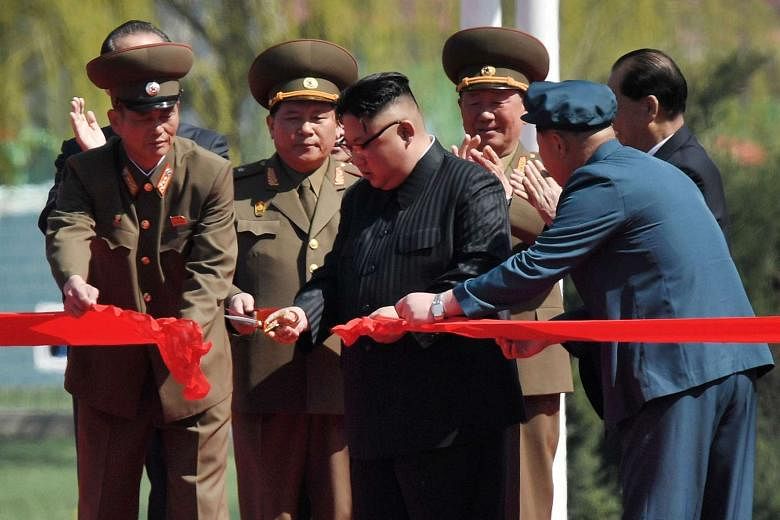PYONGYANG (REUTERS) - It's unusual being a foreign correspondent in North Korea, as a team from Reuters, among scores of journalists visiting the reclusive state, found out on Thursday (April 13).
Invited to Pyongyang for this week's celebrations of the 105th birth anniversary of founder president Kim Il Sung, the journalists were herded together for hours, not allowed water and not given access to phones - to attend a street opening by North Korea's current leader, his grandson Kim Jong Un.
The preparations began on Wednesday night when North Korean government minders rushed into the media centre at our hotel just after 10 pm, told us to stop working and pack up our laptops because "you won't be coming back here tonight".
Gathered in the lobby, we were told there would be a "big and important" event on Thursday. With tensions high because of the possibility that Pyongyang may conduct a nuclear or long-range missile test in defiance of US warnings of retaliation, the words were striking.
Our minders refused to give details. Just bring your passports and cameras, nothing else. No phones, no laptops, no water. "No water?" we ask.
One of our government minders, Ri Hyon Mu, shifted awkwardly.
"I am being very direct now. Please urinate and excrete before the event as there will be no water closets."
No more details were given, except to be ready for a 6 am start.
At 4.45 am, the phone rang. It was Ri. Our wake-up call had been pushed forward.
Soon, the hotel lobby was thronging with journalists from around the world, armed with video and photo cameras, all with blue armbands with white letters that read "journalist" in Korean.
We were piled into buses that weaved through the manicured streets of Pyongyang as the sun rose. Groups of men in grey suits and women in colourful dresses, many holding bunches of red and pink plastic flowers, were walking briskly, a sign we were headed to a mass rally of some sort.
We arrived at the People's Palace of Culture for what turned into a two-hour security check, where our wallets and chocolate were taken away and tied up in black plastic bags.
The Reuters team boarded a bus after the security check, only for a minder to shout at us to get off - "This bus is for Americans only!"
"That's the imperialist bus," O Kum Sok, another minder, explained with a grin, as we got into another bus.
We set off again at around 7.30am, passing crowds of North Koreans, some squatting, most standing. Our buses stopped just past the Chinese embassy, one of the largest foreign missions in the city.
We are at Ryomyong, a new residential street, constructed, we were told, in less than a year, lined with more than twenty buildings, each about thirty or forty-plus storeys.
Soon, tens of thousands of North Koreans had gathered in the area, some in military dress, most in traditional suits and dresses holding balloons, plastic flowers and North Korean flags. They looked curiously at us, some smiling slightly.
A brass band played as the square filled up. Then around 10 am the crowd fell silent.
Suddenly, there was fervent clapping and cheering, balloons bobbing, flags flapping. Kim Jong Un and top government officials walked onto the stage to a fanfare from the brass band reserved to mark his public appearances.
It is "a very significant, great event, more powerful than the explosion of hundreds of nuclear bombs on the top of the enemies' heads," said North Korea's premier Pak Pong Ju, the main speaker at the opening ceremony.
The completion of Ryomyong Street is one of the examples of "a brilliant victory based on self-reliance and self-development against manoeuvres by the US and vassal forces", he said, using the state's typical descriptions of the United States and its allies.
A translation of the speech was provided when we returned to the hotel.
Kim did not speak but clapped intermittently. After about twenty minutes of speeches, a thick, red ribbon was unfurled on stage. Kim cut the ribbon and was whisked away in a shiny black Mercedes as his sister Kim Yo Jong bowed deeply.
Ryomyong Street was officially open.


